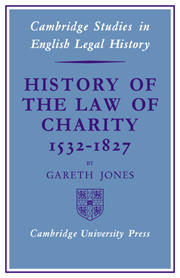Book contents
- Frontmatter
- Contents
- Preface
- List of Abbreviations
- Table Of Statutes
- Table Of Cases
- THE DEVELOPMENT OF THE LAW OF CHARITY 1532–1700
- THE DEVELOPMENT OF THE LAW OF CHARITY 1700–1827
- VI Introduction
- VII The Mortmain Act, 1736
- VIII The Preamble to the Charitable Uses Act, 1601, and the Definition of Charity
- IX The Influence of the Mortmain Act, 1736, on the Definition of Charity
- X The Development of the Law of Charity 1700–1827: The Privileges of Charity
- XI The Enforcement of Charitable Trusts 1700–1827
- Appendixes
- Index
IX - The Influence of the Mortmain Act, 1736, on the Definition of Charity
Published online by Cambridge University Press: 07 October 2011
- Frontmatter
- Contents
- Preface
- List of Abbreviations
- Table Of Statutes
- Table Of Cases
- THE DEVELOPMENT OF THE LAW OF CHARITY 1532–1700
- THE DEVELOPMENT OF THE LAW OF CHARITY 1700–1827
- VI Introduction
- VII The Mortmain Act, 1736
- VIII The Preamble to the Charitable Uses Act, 1601, and the Definition of Charity
- IX The Influence of the Mortmain Act, 1736, on the Definition of Charity
- X The Development of the Law of Charity 1700–1827: The Privileges of Charity
- XI The Enforcement of Charitable Trusts 1700–1827
- Appendixes
- Index
Summary
The judiciary initiated and welcomed the Georgian mortmain statute. Yet they made little attempt to limit the class of objects which the law had hitherto deemed to be charitable, for the terms of the Mortmain Act, 1736, enabled them to protect the interests of the family by characterising the object of the testator's bounty as charitable. This had the immediate effect of avoiding the devise and causing the property to result to the heir or the next-of-kin. Thus, in Jones v. Williams in 1767, Lord Camden was asked to consider whether a bequest of £1,000, to be paid from the sale of land, for bringing spring water from St Arvans or elsewhere to the town of Chepstow for the use of the inhabitants for ever, was charitable. He held that it was, and that consequently it was void. Again in Turner v. Odgen a legacy payable out of land, for preaching a sermon on Ascension Day, for keeping the chimes of the church in repair, for the playing of certain psalms and for paying choristers was categorised as charitable and struck down; and in Townley v. Bedwell a devise of a mixed fund of realty and personalty to establish a perpetual botanical garden was avoided as being a devise to charity. Conversely, there is no reported case of a devise being saved from the Mortmain Act, 1736, by a finding that the particular public object was not charitable.
- Type
- Chapter
- Information
- History of the Law of Charity, 1532-1827 , pp. 128 - 133Publisher: Cambridge University PressPrint publication year: 1969

